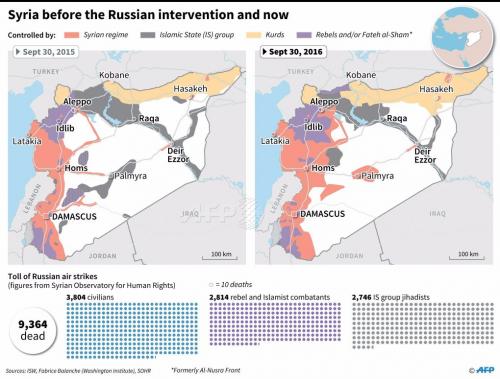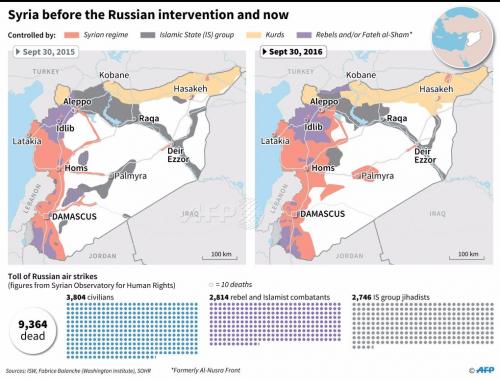As the drums of war beat louder, following last week’s ultimatum by John Kerry that the US is contemplating a direct military intervention in Syria, including potentially sending US troops on the ground in the war-torn country for the first time, on Saturday Russia warned the US against carrying out any attacks on Syrian government forces, saying it would have repercussions across the Middle East. The warning comes as government forces captured a hill on the edge of the northern city of Aleppo under the cover of airstrikes.
It has been one year since Russia became officially involved in the Syria conflict. The maps below show zones controlled by different forces before Russian intervention in September 2015 and the situation now.
The most obvious change is the collapse in territory controlled by ISIS, as well as the expansion of territories held by the Syrian regime, which is the biggest concern to the US, whose main directive in the Syrian conflict has been less to crush the Islamic State as to minimize the influence and territory of Assad’s regime, replacing it with US-controlled “rebel” forces.
And with Russia – long an ally to Assad as the conflict is fundamentally about Gazprom’s loss of influence over Europe should a Qatari natgas pipelines cross under Syria – having become the biggest hurdle to US strategy in Syria, there has been a notable shift in the US strategy, with western media slamming Russia’s “barbarous airstrikes,” focusing on recent bombing strikes of the rebel-held city of Aleppo, a repeat of US strategy from the summer of 2013 when a doctored “chemical attack” YouTube video was used to justify US presence in the local conflict.
In response, Russian news agencies quoted Foreign Ministry spokeswoman Maria Zakharova as saying that “US aggression” against the Syrian army “will lead to terrible, tectonic consequences not only on the territory of this country but also in the region on the whole.”
She said regime change in Syria would create a vacuum that would be “quickly filled” by “terrorists of all stripes.”
As AP notes, US-Russian tensions over Syria have escalated since the breakdown of a cease-fire last month, with each side blaming the other for its failure. Syrian government forces backed by Russian warplanes have launched a major onslaught on rebel-held parts of the northern city of Aleppo. Syrian troops pushed ahead in their offensive in Aleppo on Saturday capturing the strategic Um al-Shuqeef hill near the Palestinian refugee camp of Handarat that government forces captured from rebels earlier this week, according to state TV. The hill is on the northern edge of the Aleppo, Syria’s largest city and former commercial center.
The al Qaeda-linked Ahrar al-Sham militant group said rebels regained control Saturday of several positions they lost in Aleppo in the Bustan al-Basha neighborhood. State media said 13 people were wounded when rebels shelled the central government-held neighborhood of Midan.
Adding to the propaganda, airstrikes on Aleppo struck a hospital in the eastern rebel-held neighborhood of Sakhour putting it out of service, according to the Britain-based Syrian Observatory for Human Rights, the same entity that created the infamous doctored 2013 YouTube video.
Opposition activist Ahmad Alkhatib described the hospital, known as M10, as one of the largest in Aleppo. He posted photographs on his Twitter account showing the damage including beds covered with dust, a hole in its roof and debris covering the street outside. A doctor at the hospital told the Aleppo Media Center, an activist collective, that thousands of people were treated in the compound in the past adding that two people were killed in Saturday’s airstrikes and several were wounded.
“A real catastrophe will hit medical institutions in Aleppo if the direct shelling continues to target hospitals and clinics,” said the doctor whose name was not given. He said the whole hospital is out of service.
In a familiar repeat of the 2013 media narrative, opposition activists have blamed the President Bashar Assad’s forces and Russia for airstrikes that hit Civil Defense units and clinics in the city where eastern rebel-held neighborhoods are besieged by government forces and pro-government militiamen.
On Friday, the international medical humanitarian organization Doctors Without Borders demanded that the Syrian government and its allies “halt the indiscriminate bombing that has killed and wounded hundreds of civilians_many of them children,” over the past week in Aleppo. “Bombs are raining from Syria-led coalition planes and the whole of east Aleppo has become a giant kill box,” said Xisco Villalonga, director of operations for the group. “The Syrian government must stop the indiscriminate bombing, and Russia as an indispensable political and military ally of Syria has the responsibility to exert the pressure to stop this.”
It said from Sept. 21 to 26, hospitals still functioning in Aleppo reported receiving more than 822 wounded, including at least 221 children, and more than 278 dead bodies_including 96 children_according to the Directorate of Health in east Aleppo. Sweden’s Foreign Minister Margot Wallstrom criticized attacks on civilian targets writing on her Twitter account: “Unacceptable to bomb civilians, children and hospitals in #Aleppo. No humanity. Assad & Russia moving further away from peace.”
Surprisingly, few if any in the western media have complained about the thousands of civilians killed by the US-backed Saudi bombing campaign in neighboring Yemen.
Meanwhile, according to leaked closed-door comments by US Secretary of State John Kerry it was revealed how angry John Kerry is about being unable to topple President Bashar Assad by military means.
The New York Times previously acquired a taped conversation between the US
Secretary of State and two dozen Syrian civilians from education,
rescue, and medical groups working in rebel-held areas, during a meeting
on the sidelines of the United Nations General Assembly. “I’ve argued for use of force. I stood up. I’m the guy who stood up and announced we’re going to attack Assad because of the weapons, and then you know things evolved into a different process,” the Secretary of State said in the tape.
He told the civilians that “you have nobody more frustrated than we are (the US)” that the Syrian issue is now being solved diplomatically. Kerry also warned the Syrians, who sounded clearly unhappy with Washington’s contribution, that attempts to intervene militarily or provide more support to the rebels by the US may have a reverse effect.
“The problem is that, you know, you get, quote, ‘enforcers’ in there and then everybody ups the ante, right? Russia puts in more, Iran puts in more; Hezbollah is there more and Nusra is more; and Saudi Arabia and Turkey put all their surrogate money in, and you all are destroyed,” the diplomat explained.
We expect the Syrian proxy war to continue to escalate until either Assad is removed, which however seems unlikely with Russian, and now Chinese backing, behind the Syrian president, or until the proxy war escalates into a full blown world war once US troops are sent to Syria, a move which would be met by a proportional response by Russia and, perhaps, China.
Reprinted with permission from Zero Hedge.


